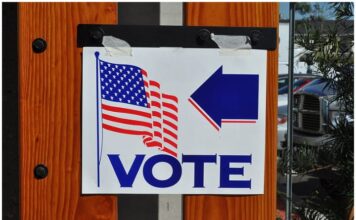“Elections belong to the people. It’s their decision. If they decide to turn their back on the fire and burn their behinds, then they will just have to sit on their blisters.”
– Abraham Lincoln
When our founders penned the Constitution, they did not mention voting. This was an experiment in self-government that protected both minority and majority rights. They feared inherent voting or rule by the masses would not protect the minority. They believed patriotic citizens like them would forever protect the rule of law in a nation, based on citizen self-government, not on political parties.
Our founders believed mass arbitrary voting would force rule by factions. This belief was supported by the failures of past republics. There is clear evidence if the majority has the power to suppress the minority they can limit or take away rights. Our founders felt it was more important to divide and limit government powers to protect our rights than to limit extracting the rule of law from the voters.
What Americans assume as the right to vote resulted from broad shifts in American beliefs during the early 1800s. When Vermont, Kentucky and Tennessee entered the union, they included voting as a right in their Constitutions. The idea was popular but never a federal law.
“The most important office, and the one which all of us can and should fill, is that of private citizen.”
– Louis Brandeis
It was not until after the Civil War in 1870 under the 15th Amendment that all men could vote in all elections. But that didn’t recognize voting as a right; only the right to equal treatment. Women were not granted the right to vote until the passage of the 19th Amendment in 1919. But that didn’t make voting an inherent legal right. Even the 1965 Voting Rights Act did not enshrine voting as a right in the Constitution. It only made it a crime to deny anyone from voting who had been qualified to vote.
Today, voting remains a privilege protected by laws. Still people think it is a right due to a lack of civic education. Schools today teach little about the Constitution or our founding. They focus on obscure historical identity group events, and being politically correct. They teach what they’re told to teach.
“Don’t believe what your teacher tells you merely out of respect.”
– Gautam Buddha
Although our founders were some of the wisest Enlightenment thinkers of their time, their greatest collective flaw was believing future Americans would protect and serve the nation they created for them. They were confident by protecting individual rights from the will of the majority, each citizen would have a voice in government. Therefore they left the managing of elections up to each state.
At the 1787 Convention, Virginia’s George Mason refused to sign the Constitution since it did not contain a bill of rights. He argued it was needed to assure the people this was a government they could control and it would not control them. The right to vote was included in his proposal. But his bill of rights was rejected when delegates claimed that outlining specific rights would imply those were the only rights reserved to the people. Mason never signed the Constitution because of this.
When the colonies saw the Constitution, they did not mention a word about “the right to vote” that had been omitted. They were more concerned about their right to protect themselves from the government and ability to rise up against it and take it out if it ever became abuse and tyrannical! They demanded a bill of rights before they would even consider ratifying this skeptical document.
“To disarm the people is the best and most effectual way to enslave them.”
– George Mason
In 1788, James Madison, who drafted much of the Constitution, took up the task of drafting a bill of rights. Madison largely drew from the Virginia Declaration of Rights, which was written by Mason in 1776. He also drew from amendments suggested by the states’ ratifying conventions.
Madison drafted 19 amendments, none of which was the right to vote. He presented these to the House of Representatives on June 8, 1789, which approved 17 and sent them to the Senate. They approved 12 and sent them to states for ratification. On Dec. 15, 1791, the states approved only the most important 10, without a whimper about “voting” not being considered a basic right.
Ratification historian Pauline Maier wrote, “The Bill of Rights was closely scrutinized by Congress to insure every concern of the colonies was included.” And the colonies’ two most salient concerns were free speech and the right to bear arms. These are the first two amendments. The colonies felt if they had the right to free speech and to bear arms they could protect every other right they had.
“Due to a man’s lust for power, I fear given too much power, can be oppressive.”
– George Mason
Our founders said our rights were bestowed by the Creator, and were “human rights.” They felt the right to citizenship was not a human right and that right must be balanced with responsibility. And since voting was only for citizens in good standing, it was not a Constitutional right but a privilege.
Furthermore, the colonies felt if they had the right to free speech, that meant it was a right to vote.
The U.S. Supreme Court and Constitutional scholars agree voting is a privilege. They also agree the right to free speech is a “human right,” inherent to the Constitution and to every citizen in this nation. Although the right to vote is not a Constitutional right, the accurate counting of these votes is a protected right since “voting is an expression of free speech” protected under the Bill of Rights. Guaranteed rights cannot be denied to anyone. Privileges must be earned to be used in a society.
Throughout our history suppression of free speech has diminished our liberty. We’ve allowed it so long, politicians, teachers and media violate it freely. Within the last decade, assaults against our First Amendment rights have been abusive; especially last election. Free speech was violated on every ballot not properly recorded. Since voting is an expression of free speech, every ballot must legally be counted under First Amendment guarantees.
“Every vote counts. Just ask me, I know.”
– Al Gore
Adolf Hitler said, “Ignorant masses are easily controlled.” Common Core has dumbed down pupils. They no longer know their rights or how to protect them. They are told being fair is more important than following the law. Teachers explain how capitalism is unfair since only some people win while others lose. They teach that socialism is fair and makes everyone equal. And this continues in the universities. Do students feel it is now OK to make elections more fair by making them less legal?
Dr. Martin Luther King told us, “Nothing in the world is more dangerous than sincere ignorance and conscientious stupidity.” We took a huge step backwards this election when we made a wrong far left turn. This unveiled our total lack of Constitutional knowledge. The next four years will be the most pivotal in our history. Will we give into socialism? Surrender decades of lost income and liberty to socialist lies? Or will we return to growth, prosperity and the protection of our rights that we are entitled to as patriots? Is our ignorance bliss or will we recall Ben Franklin said he gave us a republic if we can keep it?
“Being ignorant is not so much a shame, as being unwilling to learn.”
– Ben Franklin
By William Haupt III | The Center Square
Go to Source
Reposted with permission


![Wisconsin Sen. Duey Stroebel Supports IVF, Birth Control [Fact Check] duey stroebel](https://www.wisconsinrightnow.com/wp-content/uploads/2024/10/MixCollage-22-Oct-2024-11-52-PM-8709-356x220.jpg)













